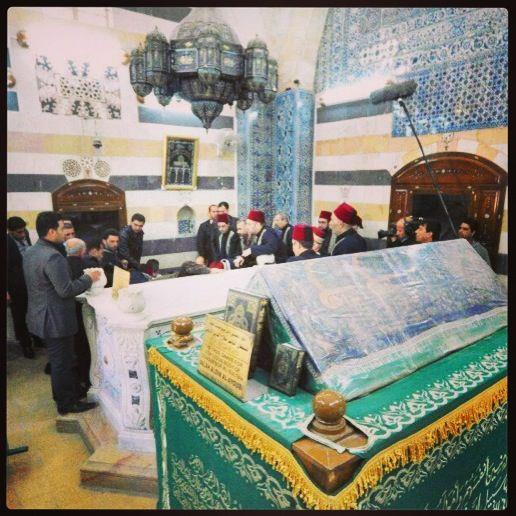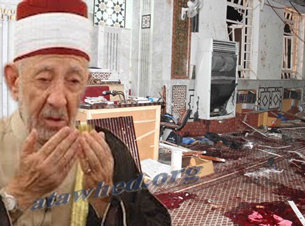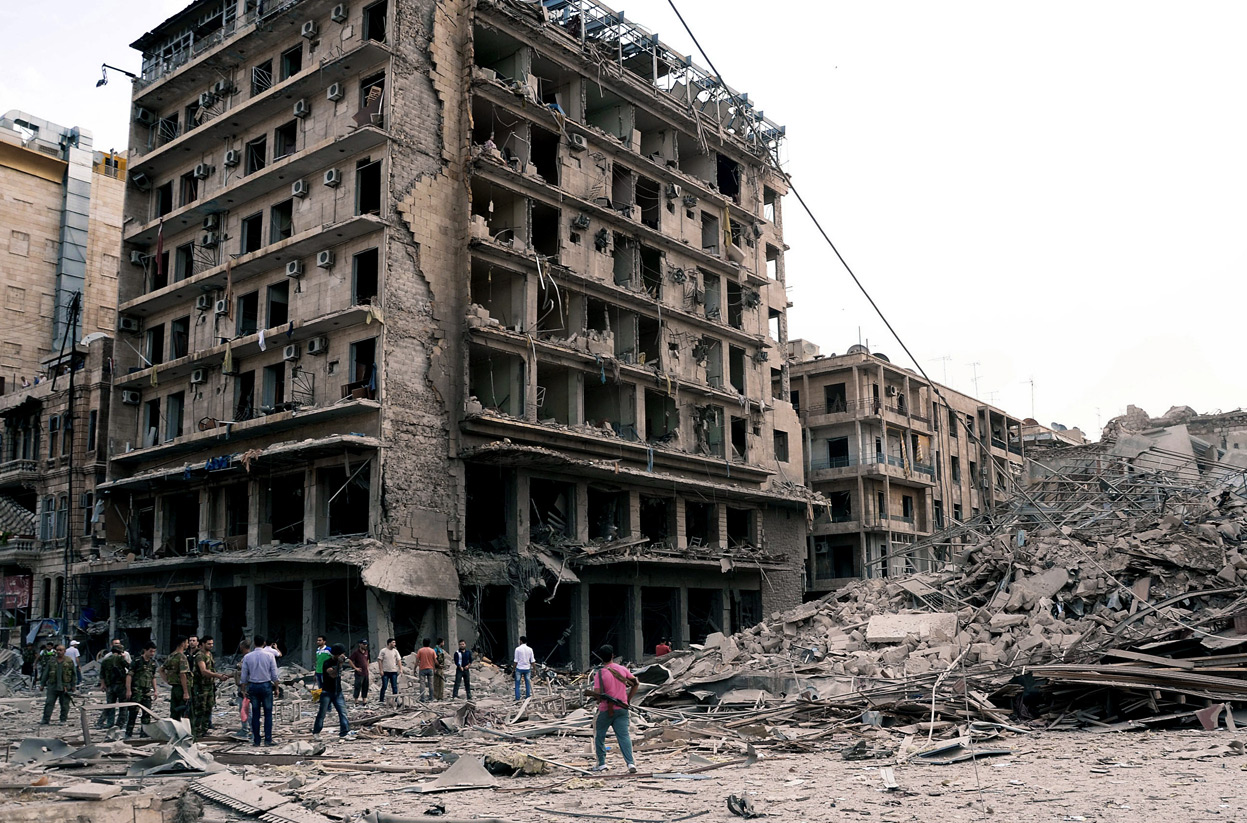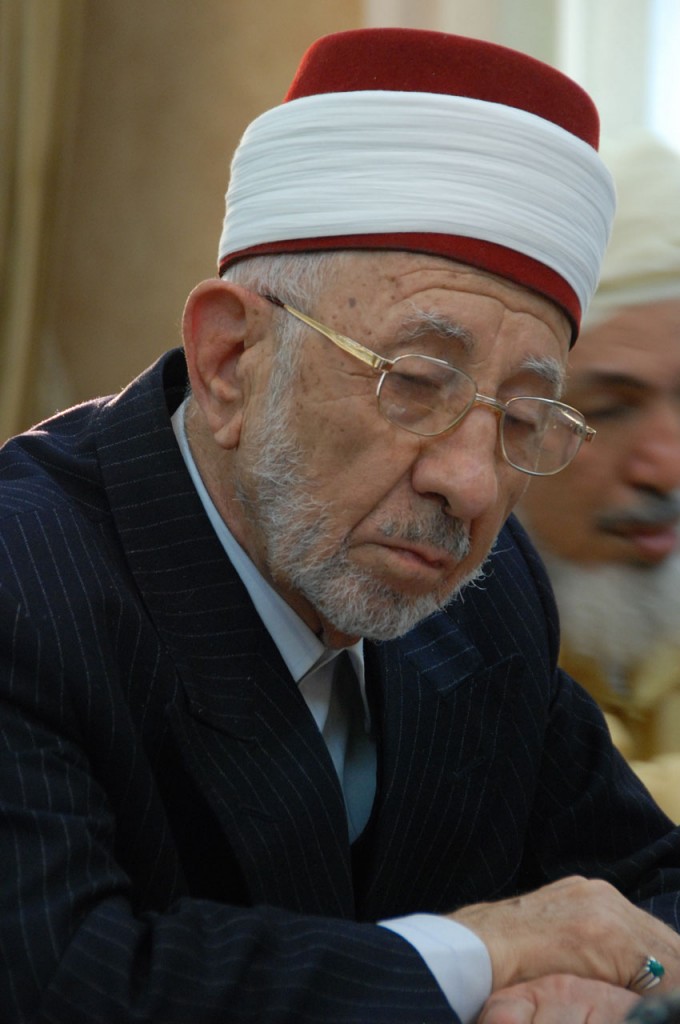The most senior Syrian scholar of Islam, Shaykh Muhammad Sa’id Ramadan al-Bouti, was killed in a large-scale bomb blast in Damascus on March 21, 2013. Shaykh al-Bouti was offering religious instructions inside a mosque when he and dozens were killed, with many more wounded.
Al-Bouti was known as a distinguished and moderate cleric, whose highly sophisticated intellectual approach stood up to Marxists and nationalists on one hand, and to Salafi Muslims on the other. There is a good biography of Shaykh al-Bouti, including coverage of his significance.
Shaykh al-Bouti had authored over 60 books, and offered a passionate defense of the idea that Muslims need to have elevated standards of religious thought in form of classical schools of thought (madhhab), instead of the more free-flowing “everyone can interpret using the Qur’an and the words of Muhammad” for themselves model favored by the Salafis.
The bombing that took al-Bouti’s life also took the lives of 42 other people. Included among the dead was Shaykh al-Bouti’s grandson, Ahmad. The Syrian conflict so far has taken over 70,000 lives, and shows no sign of coming to an end. Multiple countries are lined up on either side: Iran and Russia are supporting the Bashar al-Assad regime; and the United States, Saudi Arabia, and the Arab Gulf regimes supporting the Syrian National Coalition. Both sides have accused one another of indiscriminate slaughter, and even using chemical weapons against civilian population.
Both the Bashar al-Assad regime and the opposition have condemned the murder of the Shaykh.
There have been some rumors stating that the Shaykh was about to change his allegiance from Bashar al-Assad, and some close to him have stated that this imminent defection was the reason for his murder. However, the Shaykh’s own daughter has challenged this account, stating:
“My father’s position is clear. It was based on conviction and religious texts. He believed one should not disobey the ruler. Disobeying him may lead to strife and strife would lead to a cycle of more disorder.”
Yet the murder of Shaykh al-Bouti is of immense interest both for the sake of the learned Shaykh, and for what it says about broader issues in modern Islam. Social media in both Arabic and English has witnessed passionate debates about murder of the learned Shaykh. To admirers of the Shaykh, this murder indicates that the Syrian opposition has no moral claim to authority, and that the Assad regime has lost its connection to any real legitimacy.
If a senior and much beloved cleric like Al-Bouti can be murdered, what hope can there be for ordinary civilians?
The Shaykh’s critics—and there are just as many of them—point out that even two years after the Syrian atrocities, the Shaykh offered a staunch defense of the Assad regime. For them, such a stance with the brutality of the Assad regime negates or overwhelms any personal piety or learned scholarship that characterized decades of the Shaykh’s life. Furthermore, many are questions why there should be so much outpouring of grief about one leader when nothing has been done to stop the bloodshed of 70,000 human beings in Syria.
I too have reflected on this sad occasion, and have two short thoughts:
First, regardless of how we feel about al-Bouti’s political hesitation in condemning Bashar al-Assad, let us be clear about the depth of his piety and learnedness. One place that this was most evident was a 1999 speech before the king of Morocco, titled “The Love of Allah as the Only Remedy for All the Problems Confronting Our Arab-Islamic World.” In this lecture, Shaykh al-Bouti reflected on the causes of disunity among Muslims, and while he acknowledged political and economic shortcomings, he attributed the cause of the cause as being a deficiency of real and transformative love:
Some of us might still wonder about the relationship between the love wherewith we are honored and the process of purifying our hearts of its misguided love, on the one hand, and between that self-same love and the various complex problems we are confronting. In responding to this question, one might say that our problems, notwithstanding their number and their diversity, have one major root-cause: disparities and disunity have afflicted Muslims, giving rise to poverty after eras of opulence, vulnerability after strength, lowliness after dignity, and backwardness after preeminence in various fields. But how have Muslims allowed such disparities and disunity to emerge, persist, and wreak havoc?
I have likewise cogitated about the same issues for a long time in an attempt to find a satisfactory answer. I finally came to the conclusion that the main cause of our disunity has to do with our vacuous and loveless hearts. We have willfully emptied our hearts of the love of Allah and filled them with lust and desire of material things. Egotistical, hedonistic, and selfish in all of our endeavors, we have discarded true love, and indulged in rivalries and petty struggles. Forsaking altruism, we have grown increasingly egotistical and spiteful; giving up sacrifice and nobility, we have stooped to selfishness and self-indulgence.
[HT: Alan Godlas of University of Georgia]
There are many touching accounts from friends of Shaykh Al-Bouti, such as one American Muslim who had gone to study in Syria, and had gotten to know Shaykh al-Bouti. He remembers asking Shaykh al-Bouti about an advise that would benefit him in the Hereafter, and having the venerable Shaykh tell him: “Every day, be better than the day before.”
One of the leading Muslim scholars in the world, Habib Ali al-Jiffri, has remembered Shaykh Muhammad al-Bouti in these tender words:
“The hearts of those who appreciate the value of the great are rent asunder by the news of this loss (of) a tremendous mountain among alps, a leading light among luminaries of erudition. He spent his entire life teaching, preaching, and writing – with abstention from the fleeting world and courage in asserting what his considered analysis (ijtihad) lead him to conclude was the truth without regard to whether it pleased people or angered them.”
Habib Ali went on to say that in Shaykh al-Bouti, he found:
“knowledge, scruples, abstention, a heart filled with the love of Allah, and tearful eyes with tears of adoration and inspiring awe. The world was offered to him time and again and he refused contenting himself with a modest dwelling and with a subsistent livelihood.”
Another learned and balanced opinion was that of Shaykh Faraz Rabbani:
“While we may hold Dr. Bouti to have erred in his position–or in details of it–it was a position taken on principle: throughout his scholarly life, he held that uprisings against government cause greater harm than good; result in unnecessary loss of life; result in long-term destabilization and stir the fitnas of religious, sectarian, and ethnic divisions and conflict. Dr. Bouti may have been (inshaAllah) on the “wrong side of history” and his position could have been articulated and embraced in better ways, but it wasn’t for any worldly interests nor benefits. From the time of the Companions of the Prophet ﷺ, we have seen the high way of respectful, dignified, principled difference. Be passionate about the truth, but pursue it with reason, restraint, and respect–in ways consonant with the guidance of the Messenger of Allah ﷺ” [–Shaykh Faraz Rabbani]
At the same time, there is no sense hiding away from the political naivety that plagued Shaykh al-Bouti. Two years after Bashar al-Assad’s genocidal war against “his” own people, the Shaykh still defended him, and in fact had compared the forces of Bashar al-Assad to the Companions of the Prophet Muhammad (S). Furthermore, preaching from the pulpit of the glorious Umayyad Mosque in Damascus, Shaykh al-Bouti had repeatedly urged obedience to Bashar al-Assad, by stating:
“Jihad is obligatory upon you together with every Amir [ruler], whether he is righteous or wicked.”
Here is the sad lesson that the life of the Shaykh leaves behind for us: how do we grapple with personal sanctity and piety mired with political naivety? We have seen this trend before, in the days of the Egyptian Arab Spring, the most learned and pious clerics of Al-Azhar warned people against uprising. Part of this is due to a strong element in Sunni classical thought that has an almost phobic relationship with “political disorder” and “chaos.”
At the risk of disagreeing with a martyred great scholar, I would merely point out that “order” and “stability” are not the only Islamic political values. There is also justice. As we were told in Islam: “The realm can remain with infidelity, but it cannot endure with tyranny.” We have similar lessons in the Bible: “Follow justice and justice alone, so that you may live….” [Deuteronomy 16:20]
At best, Shaykh al-Bouti exemplified a type of learned and pious scholarship that is so wed to a quest for public order that it could be co-opted by despotic rulers. At worst, it is a reminder of the warning of Dr. King against religious leadership that risks being reduced to preaching “pious irrelevancies and sanctimonious trivialities.”
The truth, in all likelihood, is not merely in the middle, but a combination of the two. Even our best and most luminous religious scholars and clerics can show horrendous political judgments. If there ever was an age, in this age we cannot expect perfection in politics and perfection in sanctity in one and the same soul.
The body of the martyred Shaykh was laid to rest next to the iconic Muslim hero, Saladin (Salah al-Din). 
May the Shaykh be forgiven for his mistakes, may he be remembered for his piety, and may we part of creating a class of scholars whose love for God and quest for knowledge is always wed to a passionate quest for justice.
May humanity have more meaningful choices than choosing obedience to genocidal dictators and hellish war.
May the people of Syria, that ancient and beautiful land, be liberated now from the hell on Earth that has been unleashed upon them.








